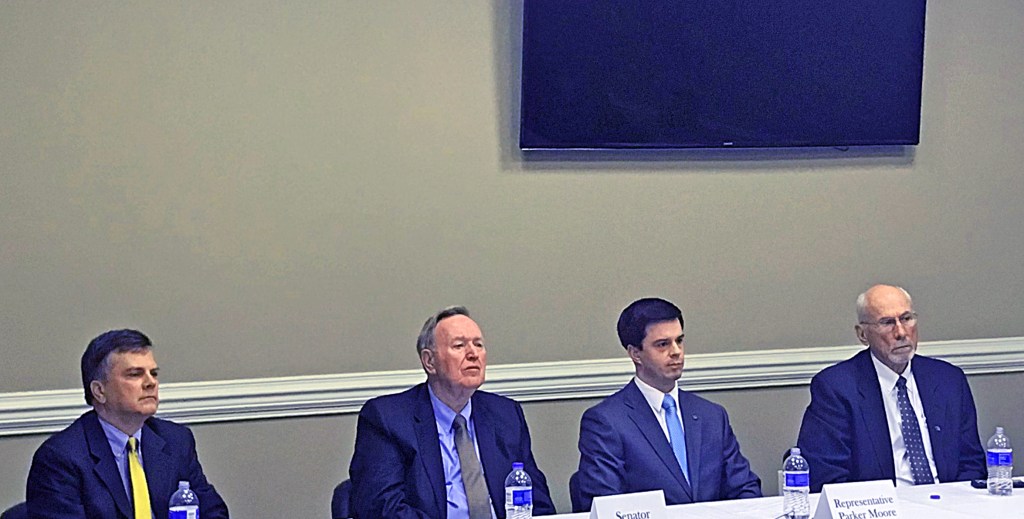Lawmakers share ideas for upcoming session at forum
Published 10:00 am Saturday, February 23, 2019

- From left, State Sen. Arthur Orr, R-Decatur, State Sen. Tom Butler, R-Madison, State Rep. Parker Moore, R-Decatur, and State Rep. Danny Crawford, R-Athens, field a question from an audience member Feb. 13 during a legislative forum presented by the Greater Limestone County Chamber of Commerce.
With a new session of the Alabama Legislature set to begin March 5, lawmakers will have a number of decisions to make on important issues, including prisons, health care and how to fund needed infrastructure projects.
In an effort to learn more about those and other issues, the Greater Limestone County Chamber of Commerce recently invited members of Limestone County’s legislative delegation to a forum, moderated by The News Courier’s Adam Smith. The following is a recap from that event:
Trending
Gas tax
Sen. Arthur Orr, R-Decatur, whose District 3 representation includes southeastern Limestone County, had the most to say on this topic. He is open to the concept of raising the gasoline tax, but had a lot of questions.
“One, we want to see hybrids and electric cars having to pay a higher fee. If they aren’t going to be paying a gas tax, they need to be paying some when they get a licensed tag every year,” Orr said.
Next, he mentioned the millions of dollars being transferred away from the Alabama Department of Transportation and into the general fund, calling it a “leak in the bucket” that added up to about $500 million since 2004.
“What if ALDOT had kept the half-billion dollars over the last 15 years? Would be having this conversation today?” he asked. “… We have a leak in the bucket, and it makes no sense to me to fill the bucket with more revenue and continue to have a leak.”
Orr wants all counties to “put skin in the game” at a local level, saying even those with two gas stations in the entire county need to contribute through local gas taxes if they expect to get a piece of the new revenue. When it comes to where new roads are built, Orr hopes politics take a backseat to traffic counts and economic potential.
Trending
Traffic congestion was also a concern for Sen. Tom Butler, R-Madison, who represents part of eastern Limestone County in District 2. He called Morgan, Limestone and Madison counties a “golden triangle of economic opportunity.”
“If we stop economic development right now, we’ve got 15,000 jobs on the board, already committed, already coming over the next five years,” Butler said. “If you look at an average of three people per household, that’s 45,000 new people. … You’ve got to have infrastructure to support that, and right now, we cannot handle the traffic we have.”
Butler said he hadn’t seen a bill yet and couldn’t say what he would do once one is presented. He likes that the Legislature would be addressing the problem, however.
Like Butler, Rep. Parker Moore, R-Decatur, hasn’t seen a bill but said something “desperately needs to be done.”
“Nothing’s been addressed in 25 years,” Moore said, adding he was 4 years old the last time the gasoline tax was increased. “The price of things back then and the cost of goods to maintain everything has gone way up. You can’t use the same amounts of funds you had back then when everything else has risen.”
Rep. Danny Crawford, R-Athens, said he had changed his stance on the topic after fighting it for three years. Now, like the others, he said he is open-minded to the idea and agrees something needed to be done.
“Sen. Orr has been talking about this for a few years,” Crawford said. “He’s way ahead of the thinking on this, and I’m trying to catch up. Now I will support it, and I will support it provided we look at a lot of different things.”
Trade programs
Each man praised the local school systems for providing more options for Alabama’s future workforce. Moore said he went to college because it was the “it” thing to do, but looking back, a lot of his classmates would have been better off with the trade school and job training options available now.
“I think we’re very blessed in this area with the trade schools we have, and I hope to expand that and continue to work with the industries to create more programs that will benefit our young adults coming out and give them better experiences,” he said.
Butler extended the praise to include local colleges and universities.
“I’m excited about what I’ve seen about the focus of high schools and in our community college system that we’re blessed to have here with Calhoun, both in Huntsville and Decatur, with Athens State here and with UAH, all our four-year universities that we have here,” Butler said. “We are prepared to meet the job requirements for new employees and that’s going to be a focus in the Legislature from my point and from Gov. Ivey.”
Crawford said perhaps the most important thing he’s noticed is the level of communication between industries and education regarding workforce.
“We’re finding out what our needs are two, three, four years from now and preparing for them,” he said. “… I appreciate the partnership, and I think that’s a big part of our success so far.”
Orr said Ivey would be addressing Alabama’s workforce, calling both Ivey and Limestone County leaders in that regard.
“Working with young people and trying to change the notion that every child needs to go to college, … Limestone has been a leader in that regard with their career tech center that they have in south Athens, just a real leader in this regard, and you’re going to see more and more of that across the state,” he said.
Prison plans
When asked about the need to improve the state’s prison system, Butler shared some of what he knew of the governor’s recently announced plans. He learned more a few months prior, when the governor’s office announced it “was going to be able to move forward with or without the Legislature on something.”
Turns out, it was a plan to build three prisons, he said, including one for elderly inmates and people with mental health needs. Butler said there were a few options for the state, but at the end of the day, “we’ll just have to see. The devil is in the details.”
Orr and Moore each made it clear they had not been briefed by the governor’s office on the plan but had relied on what they’d read from other sources when determining where they stood on the issue.
“What I’ve read is the savings that should occur by building new installations or facilities would be enough to pay for the debt and pay the debt off over time,” Orr said. “I hope that’s true, and that’s about all I know.”
“I was interested to see she included the mental health aspect,” Moore said. “… We are seeing mental health care patients in our prison systems. We need to get them the treatment they need and deserve, whether that be at the prison system or to pull them out.”
Crawford said he was open-minded about the plan but had concerns about paying for it.
“It would be great if savings would pay for the buildings, but man, that’s a hard thing to believe,” he said. “… We can’t afford a strain on the general fund even more than it is now.”
Medicaid
Crawford attributed Medicaid’s recently announced budget savings to more Alabamians working. He hopes the state would “see the gorilla in the room sort of get smaller” and was optimistic about the shape of Medicaid.
Moore agreed, adding he had spoken with people in health care and planned to take their concerns to Montgomery. Otherwise, he said he felt like Medicaid was in good shape.
However, Orr said unemployment rates weren’t as influential as one may have hoped, with 3-percent rate only allowing Medicaid enrollment to level off instead of returning to where it was 10 years ago. He also criticized federal reimbursement rates for being so low.
“We do services here and get paid very little for them, which leaves the medical community in a difficult situation,” Orr said.
Butler called it “a wait-and-see game” in which he hoped to see the government comparing its health care system to other states and seeing if there were any cost-savings measures that could be taken. He said states that expanded their Medicaid program under the Affordable Care Act were now looking into repealing their decision.
“Health care is complex right now,” he said. “There are a lot of needs out there, particularly among working families, and we’re just going to have to see and try to do the best we can with what we’ve got and see if there’s additional monies that can be acquired and where they can come from.”
Upcoming legislation
While each man had his own concerns and ideas for what to accomplish in Montgomery this session, with many reaching statewide, none had legislation in mind that was specific to Limestone County except for Crawford.
“We’re giving tickets — traffic tickets — and things in these annexed areas, but we aren’t getting the money to go to court here in Limestone County. We’re going to have to look at that, and I’m working with our district attorney to see what we can come up with,” he said.
Butler said he had plans to look at generating more revenue, such as in tourism, which could in turn affect Limestone County through places like the Alabama Veterans Museum and Archives, which he said brings in about 12,000 visitors per year.
Moore called the potential for growth in the county “unprecedented.”
“Whatever we can do to assist and help achieve the goals that the community has will be very beneficial,” Moore said.





